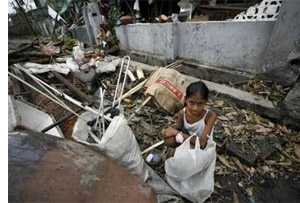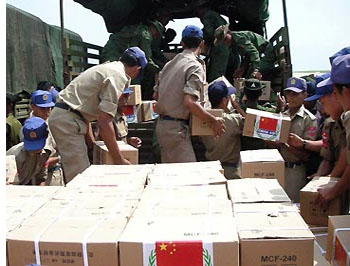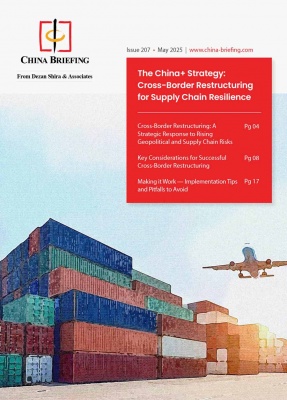China Pledges Relief as Myanmar Faces Pressure to Allow International Aid In
 May 8 – As Myanmar struggles to respond to a disaster of epic proportions, the ruling military junta is coming under increasingly strident calls by the world community to open the nation’s doors to international aid organizations. This has put the reclusive government in a position it extremely dislikes, having to ask the outside world for help.
May 8 – As Myanmar struggles to respond to a disaster of epic proportions, the ruling military junta is coming under increasingly strident calls by the world community to open the nation’s doors to international aid organizations. This has put the reclusive government in a position it extremely dislikes, having to ask the outside world for help.
“The devastation of Saturday’s cyclone, which took more than 22,000 lives, has forced the junta to soften its pose of self-sufficiency and ask for help from a world it fears and resents,” says the New York Times’ Seth Mydans in a recent analysis for the newspaper. “The government is showing its reluctance now by accepting the aid it requested only slowly, complicating visa procedures for international donors and apparently seeking to limit the access of foreign relief workers.”
Like many countries, China pledged to help Myanmar recover from the natural disaster. President Hu Jintao, in a message to Myanmar’s ruler, Gen. Than Shwe, said that China would provide help and aid to Myanmar’s reconstruction efforts. China offered US$1 million worth of aid, including relief materials worth US$500,000, to help Myanmar with its disaster relief and rehabilitation efforts. The first batch of relief materials offered by China arrived in Yangon Wednesday afternoon, sources with Chinese foreign ministry said.
 “China and Myanmar are good neighbors. We believe the people of Myanmar can overcome the obstacles caused by the cyclone and recover their losses as soon as possible,” Qin Gang, a foreign ministry spokesperson said on Tuesday.
“China and Myanmar are good neighbors. We believe the people of Myanmar can overcome the obstacles caused by the cyclone and recover their losses as soon as possible,” Qin Gang, a foreign ministry spokesperson said on Tuesday.
China has somewhat better ties to Myanmar than most, and has used its position on the U.N. Security Council to help shield the nation from sanctions but as Kerry Howley asserts in an LA Times op-ed from October of 2007 when the Myanmar government’s crackdown on protesting monks drew world attention and condemnation, China holds very little sway over the government of Myanmar.
“The truth,” Howley says, “is that no one really understands what makes Myanmar tick. It is an information vacuum, characterized by a surreptitious, paranoid political culture suspicious of all things foreign… The generals’ decision-making process remains a mystery, and pundits fill the void with their a priori commitments. Exiles push sanctions; isolationists advocate restraint; China hawks blame China.”
“The aid has more to do with making an impression, and how it wants to be perceived by its neighbors, than how it wants to be perceived in the broader international community, in terms of the Olympics,” said Bill Kirby, a China expert and history professor at Harvard University. Kirby told ABC News that Myanmar responded poorly to the disaster, both before the cyclone hit, and in its response. “It’s a good sign that China stepped into a leadership position in its part of the world,” he said.
But China’s pledge of aid still remains quite small and Western governments, aid agencies, and the United Nations are still being barred from entering the country en masse.
Bernard Kouchner, the French foreign minister, has suggested that the United Nations should invoke its “responsibility to protect” as a basis for a resolution allowing the delivery of international aid irregardless of the junta’s permission.
“We are seeing at the United Nations if we can’t implement the responsibility to protect, given that food, boats and relief teams are there, [we need to] obtain a United Nations resolution which authorizes the delivery and imposes this on the Burmese government,” Mr. Kouchner told reporters in Paris.
The United Nations has till now, resisted calls to force the Myanmar government to accept aid, even though it has 50 to 100 aid workers waiting for word on their visa applications.
The U.S. Secretary of State Condoleezza Rice appealed to Myanmar to open its doors to international aid, asking the Asian nations of China, India, Indonesia and Japan to join in pushing the ruling junta to accept outside help.
“It is not a matter of politics. This is a humanitarian crisis,” she said in Washington on Wednesday.
International aid organizations have been pouring into neighboring Thailand since the cyclone devastated the Irawaddy Delta on Saturday, waiting for permission to enter Myanmar. The death toll could rise as high as 100,000 U.N. diplomats say. The Myanmar government currently has the death toll at 22,980, with another 412,119 people missing.
- Previous Article Olympic Torch Reaches Top of Mt. Everest
- Next Article Agricultural Trade Deficit Hits US$3.66 Billion
























